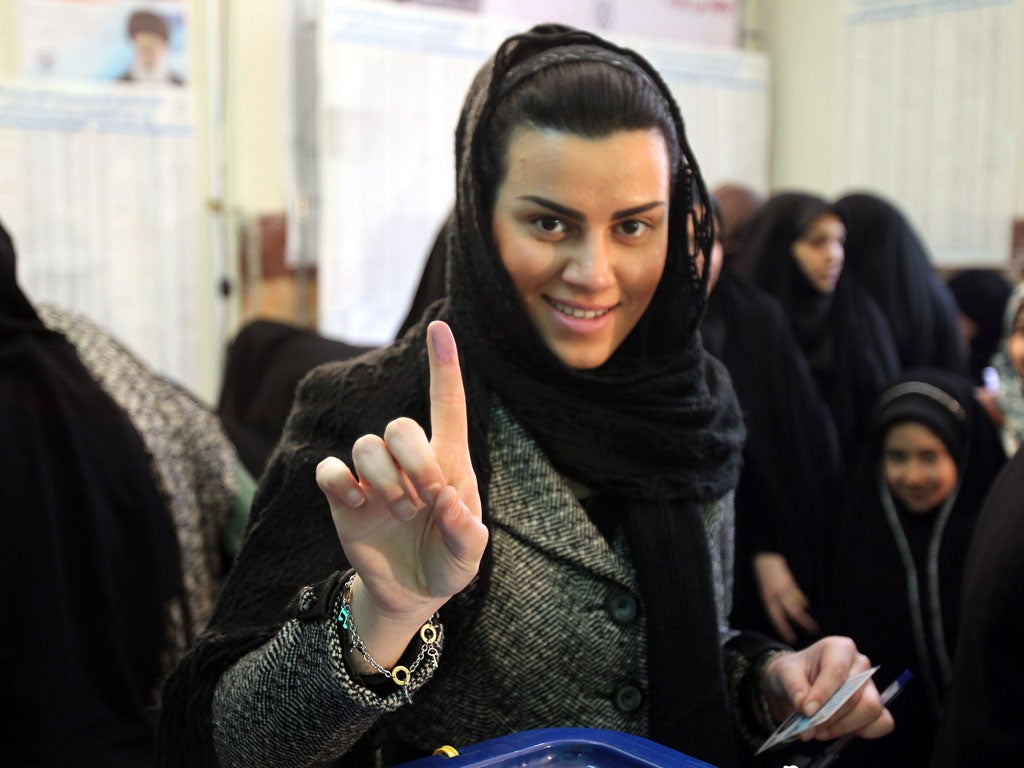Obama warns of military strike as Iran goes to polls

Your support helps us to tell the story
From reproductive rights to climate change to Big Tech, The Independent is on the ground when the story is developing. Whether it's investigating the financials of Elon Musk's pro-Trump PAC or producing our latest documentary, 'The A Word', which shines a light on the American women fighting for reproductive rights, we know how important it is to parse out the facts from the messaging.
At such a critical moment in US history, we need reporters on the ground. Your donation allows us to keep sending journalists to speak to both sides of the story.
The Independent is trusted by Americans across the entire political spectrum. And unlike many other quality news outlets, we choose not to lock Americans out of our reporting and analysis with paywalls. We believe quality journalism should be available to everyone, paid for by those who can afford it.
Your support makes all the difference.President Barack Obama warned he should be taken seriously when he says he would consider military action to stop Iran getting a nuclear weapon.
"I don't bluff," he said in remarks aimed as much at Israel as at Iran. "I think both the Iranian and the Israeli governments recognise that when the United States says it is unacceptable for Iran to have a nuclear weapon, we mean what we say," Mr Obama said in an interview with The Atlantic magazine published yesterday as Iran held parliamentary elections and days before a visit to Washington by Israeli premier Benjamin Netanyahu.
The elections in Iran were serving to underline the divisions within the country's leadership. The supreme leader urged everybody to show national solidarity in the face of increasing international pressure over the nuclear issue, while opposition leaders have called for a boycott of the election for the 290-member parliament on the grounds that they have been prevented from standing.
There is deep anger among those who believe that the presidential election of 2009, the last important poll, was stolen by President Mahmoud Ahmadinejad. Mass street demonstrations protesting against the election result as fraudulent were brutally crushed by the authorities.
The supreme leader, Ayatollah Ali Khamenei, said yesterday that it was "a duty and a right" for all the eligible 48 million voters in Iran to cast a ballot.
Mr Netanyahu will arrive at the White House on Monday for talks likely to be dominated by the gathering Iran crisis. In Canada last night, he said he would insist on his right to preserve "freedom of action of the State of Israel in the face of threats to wipe us off the map".
Mr Obama hinted in the interview that Israel should hold off from unilateral action that might bring "potential unintended consequences".
He said: "At a time when there is not a lot of sympathy for Iran and its only real ally [Syria] is on the ropes, do we want a distraction in which suddenly Iran can portray itself as a victim?"
The choice of candidates in Iran was limited with the continued house arrest of the leaders of the Greens, Mir-Hossein Mousavi and Mehdi Karroubi.
Since their success in crushing their opponents in 2009, the conservatives have split between those adhering to Ayatollah Khamenei and supporters of President Ahmadinejad.
Harsh economic sanctions are having a serious impact and it is becoming difficult for Iran to export its oil. But foreign economic pressure has also helped the state to push through economic reforms which have largely ended ruinously expensive price subsidies for fuel and electricity with the poor receiving a cash payout to maintain their standard of living.
The Iranian parliament vies for influence with other centres of power, not only the Supreme Leader Ali Khamenei, but also the Iranian Revolutionary Guard Corps and the intelligence services.
The divisions within the leadership come at a bad time as Iran faces intense external pressure. In addition to economic sanctions, Iran's main ally in the Middle East, Bashar al-Assad of Syria, is struggling to survive while the Gulf monarchies, all Sunni, are leading an offensive aimed at opposing Shiism and, if possible, overthrowing the Iranian system.
Join our commenting forum
Join thought-provoking conversations, follow other Independent readers and see their replies
Comments